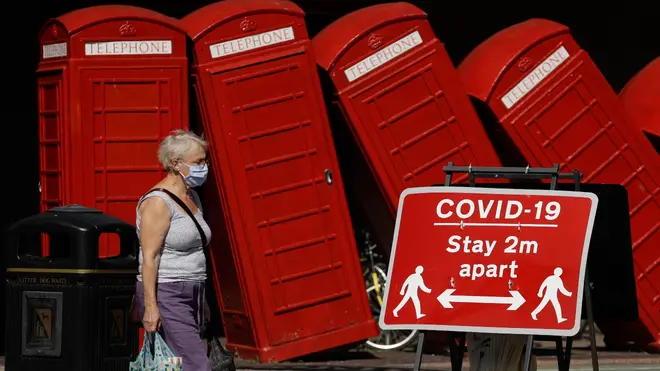
Tom Swarbrick 4pm - 6pm
22 June 2020, 19:11

The UK's coronavirus death toll has risen by 15 in the lowest daily rise since mid-March, taking the country's official tally to 42,647.
There have also been a further 958 people test positive for Covid-19, bringing the total number of infections in Britain to almost 305,289.
Monday's deaths figure represents the smallest increase since 13 March, while the total number of daily cases is under 1,000 for the first time since 22 March, the day before the UK went into lockdown.
However, Health Secretary Matt Hancock, speaking during the government's daily coronavirus press briefing, reminded the public the number of deaths recorded tends to be lower after the weekend.
The Department of Health and Social Care said there were almost 140,000 tests available today, but the number of people actually being tested is still not being recorded.
However, the government's official figures do not include all deaths involving coronavirus across the UK, which is believed to have passed 52,000.
The total number of tests to have been carried out or posted out in Britain now stands above 8 million (8,029,757).
As of 9am 22 June, there have been 8,029,757 tests, with 139,659 tests on 21 June.
— Department of Health and Social Care (@DHSCgovuk) June 22, 2020
305,289 people have tested positive.
As of 5pm on 21 June, of those tested positive for coronavirus, across all settings, 42,647 have sadly died.
More info:
▶️ https://t.co/xXnL3GbBWS pic.twitter.com/mJg2FQa94y
The figure for the number of people tested has been “temporarily paused to ensure consistent reporting” across all methods of testing.
It comes the government announced that anyone in England shielding from coronavirus will be able to gather in groups of up to six people outdoors and form a "support bubble" with another household.
At present, only people living alone or in single-parent homes are allowed to form "support bubbles" with one other household.
Health Secretary Matt Hancock said the government's shielding advice will remain in place until the end of July when people will no longer be advised to shield.
From 1 August, shielding will be paused altogether and people will be allowed to go outside while maintaining social distancing.

Why is Germany's R-number rising and are the government worried?
Meanwhile, South Korea has become the first country to declare a second wave of coronavirus infections.
The Minister of Health and Welfare, Park Neung-hoo, confirmed a further 90 imported cases across the past week, which was almost double the 48 recorded throughout the previous week.
Speaking at a government meeting on the response to coronavirus, he said: "The government faces a grave situation as health officials need not only to contain locally transmitted infections, but also manage imported cases."
Seoul's mayor, Park Won-soon, suggested the country could be facing up to 800 new cases per day in a month's time if it fails to suppress the fresh wave of transmissions.
He confirmed the R rate had reached nearly 1.8 for the period between 30 April and 11 June, indicating the country was losing control of the virus.
In Germany, the R number has dramatically jumped to almost 3 over the weekend, sparking fears of a second wave in the country.